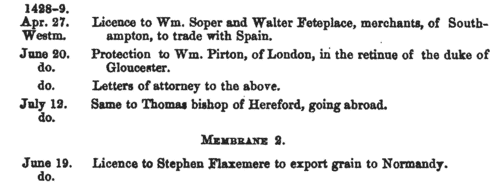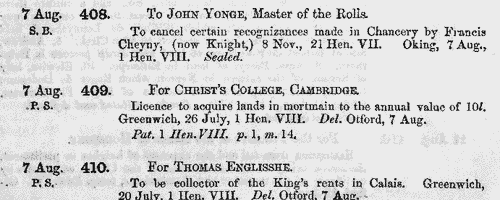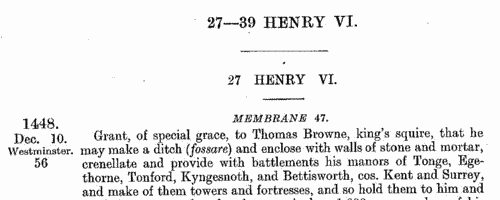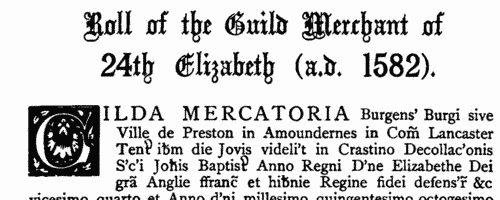Fenwyk Surname Ancestry ResultsOur indexes 1000-1999 include entries for the spelling 'fenwyk'. In the period you have requested, we have the following 19 records (displaying 11 to 19): Buy all | | | Get all 19 records to view, to save and print for £78.00 |
These sample scans are from the original record. You will get scans of the full pages or articles where the surname you searched for has been found. Your web browser may prevent the sample windows from opening; in this case please change your browser settings to allow pop-up windows from this site. The English in France
(1458)
King Henry VI of England (one of the grandsons of Charles VI of France) claimed the throne of France (and quartered the fleurs-de-lis of France with the lions of England on the royal standard) as had his predecessors since Edward III, as descendants of Philip IV of France. The English had real power or influence in Brittany, Normandy, Flanders and Gascony, and actual possession of several coastal garrisons, in particular Calais, where the French inhabitants had been replaced by English. Henry VI came to the throne only seven years after his father had trounced the French at Agincourt; but his cousin, Charles VII, who became king of France in the same year, spent his long reign rebutting the English king's claim to his throne by territorial reconquest and consolidation. The English administration kept a series of records called the French Rolls. On these are recorded royal appointments and commissions in France; letters of protection and safe-conduct to soldiers, merchants, diplomats and pilgrims travelling to France from England and returning, and to foreign legations. There are also licences to merchants to export to the Continent, and to captains to transport pilgrims. As Henry VI's reign progressed, and the English grip on northern France loosened, the French Rolls also increasingly include entries concerning the ransoming of English prisoners.FENWYK. Cost: £6.00.  | Sample scan, click to enlarge

| London and Middlesex Feet of Fines
(1198-1485)
Pedes Finium - law suits, or pretended suits, putting on record the ownership of land in London and Middlesex.FENWYK. Cost: £4.00.  | Sample scan, click to enlarge

| Patent Roll 1 Henry VIII
(1509-1510)
Royal grants of all kinds were enrolled on the Patent Rolls of England. Many of these grants originated as signed bills (S. B.) or privy seals (P. S.). J. S. Brewer calendared the rolls for the first year of the reign of king Henry VIII (22 April 1509-21 April 1510) for the Master of the Rolls, including all the surviving signed bills and privy seals (some of which had never led to enrolment), in this volume published in 1862. We have reindexed this: most of the names that occur are of those granted royal offices, or wardships or ecclesiastical preferments that were in the hands of the Crown, and often the names of those whom they superseded. FENWYK. Cost: £6.00.  | Sample scan, click to enlarge

| Recipients of grants of land by the Crown; and other grantors and grantees
(1427-1516)
Grants of land by the Crown were enrolled on the Charter Rolls: but this series of records was also used by other magnates and religious houses as a way of having their own deeds inspected, confirmed and registered. It will be seen from this that some of the material described in these inspeximuses dates back to a considerably earlier period. In addition, there is an appendix of fragments of charter roll material from 1215 and 1286 to 1288. The royal grants enrolled relate not only to land, but also to various privileges that were part of the royal prerogative.
Most of the material is from England, the remainder relating to Ireland, Wales and possessions in France, but virtually nothing from Scotland, which was an independent kingdom at this period.FENWYK. Cost: £4.00.  | Sample scan, click to enlarge

| Liegemen and Traitors, Pirates and Spies
(1542-1547)
The Privy Council of Henry VIII was responsible for internal security in England and Wales, and dealt with all manner of special and urgent matters
FENWYK. Cost: £4.00.  | Sample scan, click to enlarge

| Tradesmen of York
(1272-1558)
No man or woman could trade in the city of York without having obtained 'freedom' of the city.Their names were recorded on the 'Freemen's Roll', or Register of the Freemen of the City of York, which contains about 19,900 names for this period. A list of names was prepared for each year, the year being here reckoned as starting at Michaelmas (29 September) until 1373, and thence at Candlemas (2 February). Each annual list starts with the name of the mayor and the camerarii or chamberlains. The chamberlains were freemen charged with the duty of receiving the fees of the new freemen; of seeing that only freemen traded in the city; and of preparing this roll, which was compiled from the names on their own account books from the receipts for the fees. There are three groups of freemen: those who obtained freedom after serving out an apprenticeship to a freeman; the children of freemen; and those who claimed freedom by 'redemption', i. e. by purchase or gift from the Mayor and Court of Aldermen.
FENWYK. Cost: £2.00.  | Sample scan, click to enlarge

| Hastings family deeds
(1100-1600)
John Harley of the Historical Manuscripts Commission was invited by Reginald Rawdon Hastings to examine his family's extensive archives at the Manor House, Ashby de la Zouche, in Leicestershire. Harley produced a detailed calendar, of which is the first volume, published in 1928, Hastings himself having since died, and Harley having been killed at Gallipoli. This volume covers four categories of the records: the Ancient Deeds; Manorial and other Documents; Accounts and Inventories; and Miscellaneous Papers. Most, but not all, of the material is mediaeval. About half of the deeds relate to the family property in Leicestershire; then there are sections for Derbyshire, Nottinghamshire, Northamptonshire, Lincolnshire, Warwickshire, Staffordshire, Yorkshire, Northumberland, Norfolk, Cambridgeshire, Huntingdonshire, London, Wiltshire, Somersetshire, Devonshire, Buckinghamshire, Oxfordshire, &c. The manorial section includes a partitions of the estates of the Earls of Leicester and Wilton about 1204 and 1277; manor court rolls are mentioned, but not extracted. Choicer items from the family accounts and inventories are copied in extenso for 1596 and 1607, and thereafter summarised. Most of the later material is merely dipped into for curiosities.FENWYK. Cost: £4.00.  | Sample scan, click to enlarge

| Burgesses of Preston, Lancashire, and other members of Preston guild merchant
(1397-1682)
Freedom of the borough of Preston was necessary to trade in the town. The guild merchant maintained rolls of the burgesses, which were renewed every Preston guild, held every twenty years. The surviving rolls from 1397 to 1682 were edited by W. Alexander Abram, and published by the Lancashire and Cheshire Record Society in 1884 (volume ix). Each roll contains, firstly, a list of In-Burgesses, i. e., burgess inhabitants of the town, with the names of any adult sons eligible by way of inheritance to the freedom; then Foreign Burgesses (Burgenses Forinseci), i. e., those persons living outside the town who had acquired the freedom, plus the names of any adult sons; finally, there is a list of those who were not burgesses by inheritance, but had purchased freedom of the town. The only women to appear in these lists are three ladies in 1397, who were perhaps widows of burgesses. The text covers the rolls for the guilds merchant held in 1397 (20 Richard II: pages 1 to 7), 1415 (7 Henry V: 7-11), 1459 (37 Henry VI: 11-15), 1542 (34 Henry VIII: 15-19), 1562 (4 Elizabeth: 20-31), 1582 (24 Elizabeth: 31-46), 1602 (44 Elizabeth: 46-65), 1622 (20 James I: 65-94), 1642 (18 Charles I: 94-123), 1662 (14 Charles II: 123-159), and 1682 (34 Charles II: 160-202).FENWYK. Cost: £4.00.  | Sample scan, click to enlarge

| Merchants and traders in Newcastle-upon-Tyne
(1515-1898)
The society of Merchant Adventurers of Newcastle-upon-Tyne consisted of those who had obtained freedom of the city (allowing them to trade there) by birth as a son of, or apprenticeship, to a freeman: and within that, freedom of one of the three 'trades', i. e. boothman, draper or mercer. F. W. Dendy prepared extracts from the merchant adventurers' records, the second volume, published by the Surtees Society in 1899 containing extracts from the minute books relating to the history of the merchants' court, an account of the long-standing dispute between the Newcastle company and the London company, some extracts relating to the relations between the Newcastle company and the Eastland Company (who had a monopoly of the trade with Russia and the Baltic), copies of the oaths used by the Newcastle company, the London company and the Eastland Company, and (pages 185 to 381) a list of the apprentices enrolled in, and of the freemen admitted to, the Newcastle company. This list is arranged in a table of seven columns: Name of Apprentice; Name of Father of Apprentice and Observations (particularly, instances where an apprentice is passed over to a new master during his apprenticeship); Master; Boothman (B.), Draper (D.) or Mercer (M.); Date of Indentures: Enrolment: Admission. All the dates are normalised to New Style, i. e. to the modern calendar. Finally, there is a list of sons and apprentices of members who, having thus acquired the right of freedom of the city, took up the freedom, but did not assume the freedom of any of the three trades. The index covers all the contents of the volume, not just the apprentice and freemen lists.FENWYK. Cost: £4.00.  | Sample scan, click to enlarge

|
 | 1 | 2 |
Research your ancestry, family history, genealogy and one-name study by direct access to original records and archives indexed by surname.
|











